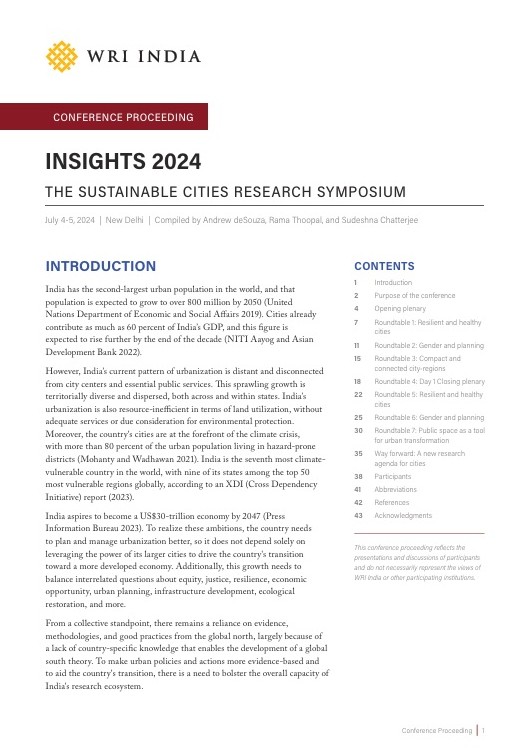Balancing Innovation and Regulation of Mobility Aggregators
by -
The ride-hailing industry has altered commuting patterns in Indian cities. Cabs have been the most popular model, followed by buses, bikes and autorickshaws, which have gained matured ridership and continue expanding their businesses.
Research predicts that the Indian ride-hailing industry will increase by over 150 per cent by 2025 from 2017. Expansion of the aggregators demands regulation and effective governance. The Ministry of Road, Transport and Highways (MoRTH) released guidelines under the Motor Vehicles (Amendment) Act, 2019 in December 2020. The aim is to regulate aggregators defined as “digital intermediary or marketplace for a passenger to connect with a driver for transportation” to reduce traffic congestion and pollution.
This blog explores how the new guidelines address several prominent concerns of aggregators that have been around.
Legal trouble for ride-hailing companies
The global ride-hailing market has had multiple clashes with governments due to concerns over commuter safety, reduced business for traditional taxis, the precarious nature of the driver-partner model, congestion, etc.
Ride-hailing came to India in 2013 and continued to operate in the regulatory grey till December 2014, when a cab driver allegedly raped a commuter in New Delhi. The accused was a repeat offender driving without a licence. Subsequently, a revision of the Radio Taxi Scheme stated that all cab aggregators must have an operating permit, to begin with. Additionally, it restricted the hiring of drivers with a criminal record within the last seven years.
In 2016, extensive guidelines by MoRTH mandated the vehicle, driver, operator, and licensing requirements upon which states began to draft city taxi rules. However, aggregators quickly challenged these ‘regressive regulations’ in court and campaigned online petitions against their ‘burdensome’ nature.
What has changed since the 2016 guidelines?
The new aggregator directives put forth comprehensive measures for drivers, passengers, and governance of aggregator services:
Better working conditions for drivers: The promise of better-earning potential attracted many drivers to purchase vehicles. Dynamic incentive structures and increasing commissions (from 10-25%) led to longer working hours and eroded incomes. Drivers hired on contractual arrangements meant no minimum wages or perks like insurance, pension, health care, etc. What followed was large and frequent protests by drivers in February 2017, October 2018 and July 2019, demanding government intervention against deteriorating livelihoods, poor working conditions, etc.
As a response to this, the 2020 guidelines propose 80% of the ride fare credited to the driver. It further prevents drivers stay logged in/driving for 12 hours. There are provisions for health insurance for a minimum of INR 5 lakh and term insurance not less than INR 10 lakh with a 5% annual increment starting 2020-21. Aggregators will also educate drivers on understanding the terms and conditions of their contracts.
Better services for passengers: Over the years, passenger safety, particularly for women, was compromised in multiple instances. This is being addressed by strengthening police verification of drivers. Know Your Customer (KYC) has also been mandated to avail carpool service, while women passengers will have the option to carpool with women only.
The guidelines also direct aggregators to establish 24x7 call centres with a telephone number and email ID visible at all times on the app. Unable to seek help through customer service has caused distress to commuters and authorities for matters that required urgent communication.
Alleged concerns over rash driving, harassment, and improper behaviour of drivers are being addressed through the five-day induction programme. This is to educate and train drivers on a broad range of issues, including road safety, first responder training, and gender sensitisation.
To better equitable service availability of aggregators, base and surge prices have altered. Discounted rides can be 50% lower than the base fare, and the surge price has capped at a maximum of 1.5 times the base fare.
Governance of aggregators: The new guidelines encourage stricter laws of suspension and violations. A provision to charge 2% over and above the fare towards road safety, green fund, etc., has been made, and authority rests with state governments. They can also investigate matters related to drivers, digital and physical infrastructure of aggregators. The guidelines instil accountability of aggregators on critical issues related to their services.
However, provisions around data sharing principles can be further strengthened, learning from countries in the global south. Trip level information like origin-destination pairs, time and duration of travel, fare, etc., is vital for transport planners to assess mobility patterns. An understanding of these spatial and temporal patterns can inform mobility planning and infrastructure investments. While the guidelines require aggregators to retain data generated by the app for 3-24 months, regular sharing of anonymised trip details is not mandated.
Efficient regulation for comprehensive disruption.
Aggregators serve a vital demand for commuters, mainly providing services in urban centres alongside other traditional modes of intermediate public transport (IPT) such as taxis and autos rickshaws. Traditional IPT services operate under regulations in terms of licensing, permits, uniforms, etc. Aggregator models posit themselves as disruptors and have known to dishonour regulations working for the ‘larger good’.
Regulation of aggregators is gradually evolving in India, with an increased understanding of their impact on cities, labour, and commuters. The present mobility sector continues to advance with innovation and calls for policies that decongest cities and improve accessibility. The latest guidelines add to the ongoing conversation while accommodating room for innovation.
Views expressed are the author's own.


